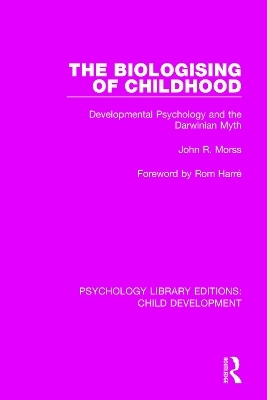
The Biologising of Childhood
Developmental Psychology and the Darwinian Myth
Seiten
2019
Routledge (Verlag)
978-1-138-03783-0 (ISBN)
Routledge (Verlag)
978-1-138-03783-0 (ISBN)
Originally published in 1990, this book looks at the history of developmental psychology in order to locate an evaluate the role played by biology in its most influential formulations.
Originally published in 1990, this book looks at the history of developmental psychology in order to locate and evaluate the role played by biology in its most influential formulations.
First Charles Darwin’s own writings on child development are examined. It is shown that Darwin endorsed such ideas as the ‘recapitulation’ of evolutionary ancestry in the developing child, even though this is inconsistent with his natural selection theory. The first great developmentalists – Hall, Baldwin, Freud – adopted and applied these non-Darwinian evolutionist ideas. The next generation – Vygotsky, Piaget, Werner – applied similar ideas in a variety of ways.
Alongside this evolutionism, but interconnected with it, sensationist/empiricist forms of epistemology were directing developmentalists (from Rousseau onwards) to see the child as having to work himself out of sense-bound experience – to develop further and further from the ‘here-and-now’.
Contemporary developmental theory retains these influences: biological approaches (ethological, psychobiological) remain pre-Darwinian in spirit; lifespan theories remain attached to biology; formal/cognitive approaches remain attached to sensationism. ‘Social context’ approaches are rather half-hearted, and it is only the social-constructionist orientation which seems to offer a real alternative to biology. Major conclusions are stated in chapter ten, which includes a re-evaluation of Darwin’s role.
Originally published in 1990, this book looks at the history of developmental psychology in order to locate and evaluate the role played by biology in its most influential formulations.
First Charles Darwin’s own writings on child development are examined. It is shown that Darwin endorsed such ideas as the ‘recapitulation’ of evolutionary ancestry in the developing child, even though this is inconsistent with his natural selection theory. The first great developmentalists – Hall, Baldwin, Freud – adopted and applied these non-Darwinian evolutionist ideas. The next generation – Vygotsky, Piaget, Werner – applied similar ideas in a variety of ways.
Alongside this evolutionism, but interconnected with it, sensationist/empiricist forms of epistemology were directing developmentalists (from Rousseau onwards) to see the child as having to work himself out of sense-bound experience – to develop further and further from the ‘here-and-now’.
Contemporary developmental theory retains these influences: biological approaches (ethological, psychobiological) remain pre-Darwinian in spirit; lifespan theories remain attached to biology; formal/cognitive approaches remain attached to sensationism. ‘Social context’ approaches are rather half-hearted, and it is only the social-constructionist orientation which seems to offer a real alternative to biology. Major conclusions are stated in chapter ten, which includes a re-evaluation of Darwin’s role.
Foreword. Preface. Acknowledgements. 1. Introduction 2. Charles Darwin and the Origins of Developmental Psychology 3. Biology and the Developmentalists: Hall, Baldwin, and Freud 4. Biology and the Developmentalists: Vygotsky, Piaget, and Werner 5. ‘The Prisoner of the Senses’: Sensationism in Developmental Thinking 6. Infancy 7. Childhood 8. Adolescence 9. Models and Processes 10. Biology and Alternatives to Biology in Contemporary Developmental Psychology 11. Conclusions. References. Reference Notes. Author Index. Subject Index.
| Erscheinungsdatum | 15.11.2019 |
|---|---|
| Reihe/Serie | Psychology Library Editions: Child Development |
| Verlagsort | London |
| Sprache | englisch |
| Maße | 156 x 234 mm |
| Gewicht | 453 g |
| Themenwelt | Geisteswissenschaften ► Psychologie ► Entwicklungspsychologie |
| Medizin / Pharmazie ► Medizinische Fachgebiete ► Psychiatrie / Psychotherapie | |
| ISBN-10 | 1-138-03783-4 / 1138037834 |
| ISBN-13 | 978-1-138-03783-0 / 9781138037830 |
| Zustand | Neuware |
| Haben Sie eine Frage zum Produkt? |
Mehr entdecken
aus dem Bereich
aus dem Bereich
Vormals Oerter & Montada
Buch | Hardcover (2018)
Julius Beltz GmbH & Co. KG (Verlag)
CHF 89,60
Grundlagen, Diagnostik und Therapie vom Säuglingsalter bis zum alten …
Buch | Hardcover (2022)
Klett-Cotta (Verlag)
CHF 62,95
praktische Hilfen für Kinder und Jugendliche im Autismus-Spektrum
Buch | Softcover (2023)
Kohlhammer (Verlag)
CHF 43,40


